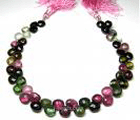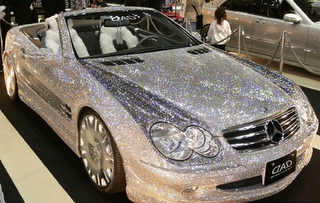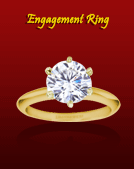Sunday, April 26, 2009
 Topaz is a silicate stone of aluminium and fluorine with the chemical formula Al2SiO4(F,OH)2. It crystallizes in the orthorhombic group and its crystals are typically prismatic terminated by pyramidal and other faces, the basal pinacoid often being present. It has an easy and perfect basal cleavage, meaning that gemstones or other fine specimens have to be handled with care to avoid increasing cleavage flaws. The fracture is conchoidal to irregular. Topaz has a resistance of 8, a specific gravity of 3.4-3.6, and a vitreous luster. Pure topaz is transparent but is generally tinted by impurities; typical topaz is wine or straw-yellow. They may also be white, gray, green, blue, pink or reddish-yellow and transparent.
posted by Tamil Nadu ,Tamilnadu Government,Places,Wild Life,Hill Stations,Temples,Sports,Accomodation,Cusine,Fine Art @ 10:24 PM
permanent link
| |
0
comments

Thursday, April 23, 2009
Color is the most clear and attractive feature of gemstones. The color of any substance is due to the nature of light itself. Daylight, often called white light is essentially a mixture of different colors of light. When light passes through a material, some of the light may be immersed, while the rest passes through. The part that could not absorb reaches our eye as white light minus the absorbed colors. A ruby appears red because it absorbs all the other colors of white light - blue, yellow, green, etc. - apart from red.
The same material can display different colors. For example ruby and sapphire have the same chemical composition (both are corundum) but display different colors. Even the same gemstone may occur in many different colors: sapphires show different shades of blue and pink and "fancy sapphires" show a whole range of other colors from yellow to orange-pink, the latter called "Padparadscha sapphire".
This distinction in color is based on the atomic structure of the stone. Though the different stones formally have the same chemical composition, they are not exactly the same. Every now and then an atom is replaced by an entirely different atom (and this could be as few as one in a million atoms). These impurities are sufficient to absorb certain colors and leave the other colors unaffected.
As an example: beryl, which is neutral in its pure mineral form, becomes emerald with chromium impurities. If you include manganese instead of chromium, beryl becomes pink morganite. With iron, it becomes aquamarine.
A number of gemstone treatments really make use of the fact that these impurities can be "manipulated", thus changing the color of the gem.
posted by Tamil Nadu ,Tamilnadu Government,Places,Wild Life,Hill Stations,Temples,Sports,Accomodation,Cusine,Fine Art @ 2:47 AM
permanent link
| |
0
comments

Monday, April 20, 2009
 Some gemstones are manufactured to reproduce other gemstones. For example, cubic zirconia is a synthetic diamond stimulant composed of zirconium oxide. The imitations copy the look and color of the real stone but have neither their chemical nor physical characteristics. Though, true synthetic gemstones are not necessarily imitation. For example, diamonds, ruby, sapphires and emeralds have been manufactured in labs, which possess very nearly identical chemical and physical characteristics to the naturally happening variety. Synthetic corundums, as well as ruby and sapphire, are very common and they cost only a fraction of the natural stones. Smaller synthetic diamonds have been manufactured in huge quantities as industrial abrasives for many years. Recently, larger synthetic diamonds of gemstone quality, especially of the colored variety, have been manufactured.
posted by Tamil Nadu ,Tamilnadu Government,Places,Wild Life,Hill Stations,Temples,Sports,Accomodation,Cusine,Fine Art @ 12:36 AM
permanent link
| |
0
comments

Thursday, April 16, 2009

1000 $s for only touching it
The price of the car is US$ 4.8 million
posted by Tamil Nadu ,Tamilnadu Government,Places,Wild Life,Hill Stations,Temples,Sports,Accomodation,Cusine,Fine Art @ 2:03 AM
permanent link
| |
0
comments

Members of the 2008 World Series Champion Philadelphia Phillies got their diamond and gold championship rings April 8 at the time of 20-minute pre-game ceremonial for a crowd of more than 44,000 people at Citizens Bank Park in Philadelphia.
Every 14k white gold ring contains 103 diamonds, adding up 3.84 cts. The 103 diamonds signify the 92 habitual season and 11 postseason wins for the Phillies in 2008. The top of the ring is crowned with a ruby inlay, topped with the Phillies' signature "P" which is inset with diamonds, the Phillies stated in a statement. The title "World Champions" is written all along the ring's apex and base outer rim. The left side of the ring traits the player's name and number atop and beneath the Liberty Bell. The right side of the ring portrays the World Series trophy mounting out of Citizens Bank Park connoting the "marvelous support" of the fans, along with the initials of the two World Series teams and the number of games won by every team.
Members of the 2008 team, coaches, manager, general manager, trainers, and the director of team travel got their rings on the field from Phillies president and chief executive officer; David Montgomery. Totally 37 rings were presented.
"A World Series Championship ring is a most valued ownership," said Montgomery. "We wanted to present our players and rest of them in the Phillies organization with an important tribute that suitably commemorates bringing a World Championship to Philadelphia. I believe this ring certainly does that."
"The ring is one of the best I've seen and it tells a grand story," said Bob Bourbeau, director of Sports and Special Markets for Masters of Design, the Attleboro, Mass.-based jewelry producer that worked with the organization. "The strange attention and level of detail that the Phillies offered all through the method allowed us to design and make an outstanding keepsake."
posted by Tamil Nadu ,Tamilnadu Government,Places,Wild Life,Hill Stations,Temples,Sports,Accomodation,Cusine,Fine Art @ 1:42 AM
permanent link
| |
0
comments

| |
Previous Posts
Thermal stability of Diamonds
Synthetic and Artificial Gemstones
Heat treatment to Gemstones
Industrial uses of Diamond
Diamond Clarity
Diamond formation
Color Factors
Diamond enhancements
Diamond Identification
Exploration Diamond drilling
Archives
May 2008
June 2008
July 2008
August 2008
September 2008
October 2008
November 2008
December 2008
January 2009
February 2009
March 2009
April 2009
May 2009
June 2009
July 2009
August 2009
September 2009
October 2009
November 2009
December 2009
January 2010
February 2010
March 2010
Current Posts
|
 Topaz is a silicate stone of aluminium and fluorine with the chemical formula Al2SiO4(F,OH)2. It crystallizes in the orthorhombic group and its crystals are typically prismatic terminated by pyramidal and other faces, the basal pinacoid often being present. It has an easy and perfect basal cleavage, meaning that gemstones or other fine specimens have to be handled with care to avoid increasing cleavage flaws. The fracture is conchoidal to irregular. Topaz has a resistance of 8, a specific gravity of 3.4-3.6, and a vitreous luster. Pure topaz is transparent but is generally tinted by impurities; typical topaz is wine or straw-yellow. They may also be white, gray, green, blue, pink or reddish-yellow and transparent.
Topaz is a silicate stone of aluminium and fluorine with the chemical formula Al2SiO4(F,OH)2. It crystallizes in the orthorhombic group and its crystals are typically prismatic terminated by pyramidal and other faces, the basal pinacoid often being present. It has an easy and perfect basal cleavage, meaning that gemstones or other fine specimens have to be handled with care to avoid increasing cleavage flaws. The fracture is conchoidal to irregular. Topaz has a resistance of 8, a specific gravity of 3.4-3.6, and a vitreous luster. Pure topaz is transparent but is generally tinted by impurities; typical topaz is wine or straw-yellow. They may also be white, gray, green, blue, pink or reddish-yellow and transparent.![]()
![]()




